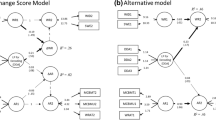Abstract
Data from 104 reading-disabled subjects tested on two occasions over an average interval of nearly five years were used to test hypotheses of differential prognosis for reading performance and symbol-processing speed as a function of gender, socioeconomic status, general intelligence, and initial severity. With respect to reading performance, significant main effects due to intelligence and severity were found. Moreover, the interaction between initial severity and test occasion was significant for reading performance due to a greater rate of improvement for the more severely disabled subjects. No evidence was obtained, however, for differential developmental rates as a unction of gender, socioeconomic status, or intelligence for this measure. With regard to symbol-processing speed, significant main effects were found due to gender, intelligence, and severity, whereas developmental rates were found to differ as a function of gender and socioeconomic status.
Similar content being viewed by others
References
Ackerman, P. T., Dykman, R. A. and Peters, J. E. 1977. Learning-disabled boys as adolescents: Cognitive factors and achievement. Journal of the American Academy of Child Psychiatry, 16, 296–313.
Baker, L. A., Decker, S. N. and DeFries, J. C. 1984. Cognitive abilities in reading-disabled children: A longitudinal study. Journal of Child Psychology and Psychiatry, 25, 111–117.
Bruck, M. 1984. The adult functioning of children with specific learning disabilities: A follow-up study. In I. Sigel (ed.), Advances in Applied Developmental Psychology (pp. 91–129). Norwood, NJ: Ablex.
Cohen, J. and Cohen, P. 1983. Applied multiple regression/correlation analysis for the behavioral sciences (2nd edition). Hillsdale, NJ: Erlbaum.
DeFries, J. C. 1985. Colorado reading project. In D. Gray and J. Kavanagh (eds), Biobehavioral measures of dyslexia (pp. 107–122). Parkton, MD: York Press.
DeFries, J. C. 1988. Colorado Reading Project: Longitudinal analyses. Annals of Dyslexia, (in press).
DeFries, J. C., Ashton, G. C., Johnson, R. C., Kuse, A. R., McClearn, G. E., Mi, M. P., Rashad, M. N., Vandenberg, S. G. and Wilson, J. R. 1976. Parent-offspring resemblance for specific cognitive abilities in two ethnic groups. Nature, 261, 131–133.
DeFries, J. C. and Baker, L. A. 1983. Colorado Family Reading Study: Longitudinal analyses. Annals of Dyslexia, 33, 153–162.
DeFries, J. C., Plomin, R., Vandenberg, S. G. and Kuse, A. R. 1981. Parent-offspring resemblance for cognitive abilities in the Colorado Adoption Project: Biological, adoptive, and control parents and one-year-old children. Intelligence, 5, 245–277.
Dunn, L. M. and Markwardt, F. C. 1970. Examiner's manual: Peabody Individual Achievement Test. Circle Pines, MN: American Guidance Service.
Finucci, J. M. 1986. Follow-up studies of developmental dyslexia and other learning disabilities. In S. D. Smith (ed.), Genetics and learning disabilities (pp. 97–121). San Diego: College-Hill Press.
Finucci, J. M., Gottfredson, L. S. and Childs, B. 1985. A follow-up study of dyslexic boys. Annals of Dyslexia, 35, 117–136.
Frauenheim, J. G. and Heckerl, J. R. 1983. A longitudinal study of psychological and achievement test performance in severe dyslexic adults. Journal of Learning Disabilities, 16, 339–347.
Gittelman, R. and Feingold, I. 1983. Children with reading disorders — I. Effects of reading instructions. Journal of Child Psychology and Psychiatry, 24, 193–212.
Gottesman, R., Belmont, I. and Kaminer, R. 1975. Admission and follow-up status of reading disabled children referred to a medical clinic. Journal of Learning Disabilities, 8, 642–650.
Hardy, M. I. 1968. Clinical follow-up study of disabled readers. Unpublished doctoral dissertation, University of Toronto, Canada.
Hinton, G. G. and Knights, R. M. 1971. Children with learning problems: Academic history, academic prediction, and adjustment three years after assessment. Exceptional Children, 37, 513–519.
Horn, W. F., O'Donnell, J. P. and Vitulano, L. A. 1983. Long-term of follow-up studies of learning-disabled persons. Journal of Learning Disabilities, 16, 542–555.
Kline, C. and Kline, C. 1975. Follow-up study of 211 dyslexic children. Bulletin of the Orton Society, 25, 127–144.
Koppitz, E. M. 1976. Special class pupils with learning disabilities: A five-year follow-up study. School Psychology Digest, 5, 45–51.
LaBuda, M. C. and DeFries, J. C. 1988. Cognitive abilities in reading-disabled and control children: A follow-up study. Journal of Learning Disabilities (in press).
Levin, E. K., Zigmond, N. and Birch, J. W. 1985. A follow-up study of 52 learning-disabled adolescents. Journal of Learning Disabilities, 18, 2–7.
Lovell, K., Byrne, C. and Richardson, B. 1963. A further study of the educational progress of children who had received remedial education. British Journal of Educational Psychology, 33, 3–9.
Meyer, M. E. 1982. A longitudinal study of 69 reading disabled children and a matched control group. Unpublished doctoral dissertation. University of Colorado, Boulder.
Muehl, S. and Forell, E. R. 1973–1974. A follow-up study of disabled readers: Variables related to high school reading performance. Reading Research Quarterly, 9, 110–123.
O'Connor, S. C. and Spreen, O. 1988. The relationship between parents' socioeconomic status and education level, and adult occupational and educational achievement of children with learning disabilities. Journal of Learning Disabilities, 21, 148–153.
Reiss, A. J., Duncan, O. D., Hatt, P. K. and North, C. C. 1961. Occupations and social status. Glencoe, IL: Free Press.
Schonhaut, S. and Satz, P. 1983. Prognosis for children with learning disabilities: A review of follow-up studies. In M. Rutter (ed.), Developmental neuropsychiatry (pp. 542–563). New York: Guilford Press.
Trites, R. L. and Fiedorwicz, C. 1976. Follow-up study of children with specific (or primary) reading disability. In R. Knights and D. J. Bakker (eds), The neuropsychology of learning disorders: Theoretical approaches (Proceedings of NATO Conference) (pp. 41–50). Baltimore: University Park Press.
Wechsler, D. I. 1981. Examiner's manual: Wechsler Adult Intelligence Scale — Revised. New York: Psychological Corporation.
Wechsler, D. I. 1974. Examiner's manual: Wechsler Intelligence Scale for Children —Revised. New York: Psychological Corporation.
Author information
Authors and Affiliations
Rights and permissions
About this article
Cite this article
Labuda, M.C., Defries, J.C. Differential prognosis of reading-disabled children as a function of gender, socieconomic status, IQ, and severity: A longitudinal study. Read Writ 1, 25–36 (1989). https://doi.org/10.1007/BF00178835
Issue Date:
DOI: https://doi.org/10.1007/BF00178835




